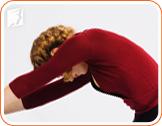
There are a variety of exercises you can do during menopause to help prevent dizziness. Dizziness, medically termed vertigo, is often the result of a lack of communication between the brain, nervous system, and balancing mechanisms of the inner ear. Because these systems must work together in order to maintain your sense of balance, exercises that help prevent dizziness primarily involve upper body movements and visual focus. Read on to find out how you can exercise to prevent dizziness.
Exercises for the Body
Motion tolerance exercises that usually involve movement of the upper body are designed to help your brain build a tolerance to certain movements and decrease your chances of feeling dizzy. Below are examples of motion tolerance exercises:

Sit on the edge of your bed and recline quickly. As you lie down, you should start to feel dizzy. Wait for the sensation to pass before repeating the exercise.
Sit in the same position on the edge of the bed, lean forward until your chest is flat against the top of your thighs. This movement should cause slight dizziness, but once it passes, sit back up. Repeat this exercise several times.
With the rest of your body remaining still, bow your head as far down as it can go. Then lift and bend it backward as far as it can go. Repeat this movement 20 times, increasing speed as you progress. Once you have built a tolerance for these head movements, try doing the exercises with your eyes closed.
Exercises for the Eyes
These short and simple activities help synchronize your vision and brain function.

Take a playing card in one hand, and hold it 12 to 18 inches from your eyes. Move the card very slowly from left to right, following it with your eyes; then reverse. Your head should remain still during this exercise. Next, move the card up and down in a straight line.
For the next exercise, hold your arm out straight in front of you with the card in hand. Focus your eyes on the card, and turn your head slowly from left to right. Do this exercise ten times to complete a full set.
More Information about Dizziness
While bouts of dizziness usually only last for a few seconds, you could feel the effects of it all day. Click the following link to learn more about dizziness treatments if it is starting to inhibit your daily routine.
Sources
- Hutchinson, Susan M.D. "The Stages of a Woman's Life: Menstruation, Pregnancy, Nursing, Perimenopause, Menopause". November 2007.
- Love, Susan M.D. Menopause and Hormone Book. New York: Three Rivers Press, 2003.
- BMJ Group. "Menopause: What is it?" Patient Leaflet. 2007.


